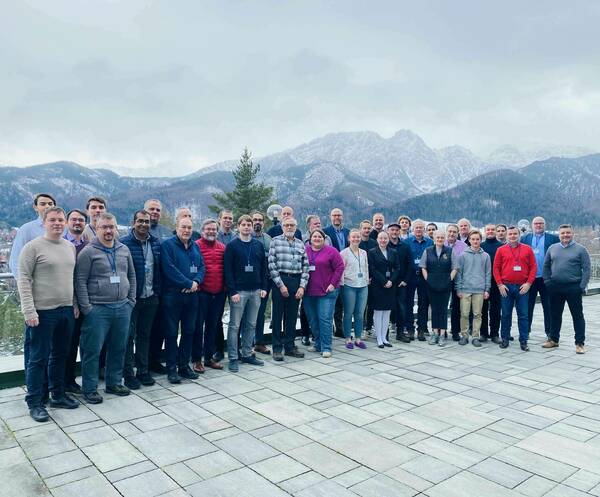
Just before the holiday season, the international scientific community convened to explore the horizons of computational science at the third GridLab Workshop.
This event, a once-in-a-decade gathering, was a collaborative effort between the University of Notre Dame’s Center for Research Computing (CRC) and the Poznań Supercomputing and Networking Center (PSNC). Co-chaired by Jarek Nabrzyski, the director of the CRC and concurrent professor in the Department of Computer Science and Engineering, and Krzysztof Kurowski, the deputy director of PSNC, the workshop was held in the scenic town of Zakopane, Poland.
Despite the GridLab project's official conclusion over two decades ago, its network of researchers continues to reunite every decade in Zakopane and bring other globally renowned computational scientists to continue a tradition of knowledge exchange and collaborative progress. This year marked the third such reunion, successfully assembling a distinguished ensemble of specialists from both sides of the Atlantic.
In a festive atmosphere with a view of the Tatras Mountains, more than 40 scientists from Austria, France, Germany, Luxembourg, the Netherlands, Poland, Slovenia, the United Kingdom, and the United States were setting the direction for the future of computing. Together, they showcased and deliberated the forefront of computing innovation, highlighting supercomputing applications, advancing quantum technology frontiers, and the transformative potential of artificial intelligence.
“The GridLab Workshops are a beacon of progress, lighting the way for computational technology's next decade in academia,” said Nabrzyski. “Our dialogues and joint efforts chart the future's challenges and prospects, reinforcing our dedication to innovation. This workshop's timing is propitious, resonating with Notre Dame's strategic direction and our 10-year strategic framework, making it integral in positioning Notre Dame at the vanguard of scientific computing."
Kurowski explained that the workshop featured both current challenges as well as emerging challenges that will shape the coming decade of computing. It especially offered a detailed look, he said, at “the development of the scientific computing infrastructure and the new and numerous applications of computer simulations.”
The workshop focused on the future of computing and e-Science, targeting academics, industry leaders, and visionaries. During the three days of the event, there were 21 presentations, and key topics included the global evolution of cyber/e-infrastructures, the role of AI in computing, and the impact of computing on society. Discussions also centered on the challenges and future of grid computing, addressing integration of diverse cyberinfrastructure elements, future-proofing against emerging tech demands, and fostering international collaboration for a unified approach in computing and e-Science.
The workshop also featured contributions from two doctoral students from the Department of Computer Science and Engineering at Notre Dame, Tasha Januszewicz and Ellen Joyce.
Januszewicz discussed the future of cryptography. She pointed out that the future of cryptography is poised to be deeply influenced by advancements in quantum computing, which threaten current encryption methods but also offer the potential for developing new, quantum-resistant algorithms. As digital security concerns grow with increasing online data exchange, there will likely be a surge in the adoption of advanced cryptographic techniques, such as homomorphic encryption, to enhance data privacy and security. Furthermore, the integration of cryptography in blockchain and distributed ledger technologies is expected to revolutionize not just financial transactions but also fields like supply chain management, voting systems, and identity verification, underscoring its expanding role in securing diverse digital interactions.
Joyce discussed the future of AI education. She emphasized the importance of AI education across all disciplines, suggesting that while not everyone needs to code, a relationship with technology is essential. Joyce also advocated for a holistic approach to teaching AI, integrating it early and thoroughly into education to align with Notre Dame's vision of leading in AI for good. Furthermore, she stressed the need to understand AI's societal impact and develop critical skills to assess its technology from the earliest stages of education.
The workshop report will be published in the next two months. The next GridLab workshop will be held in Zakopane in 2032. For more details, please see the workshop website at https://gridlab.psnc.pl
Contact
Brett Beasley / Writer and Editorial Program Manager
Notre Dame Research / University of Notre Dame
bbeasle1@nd.edu / +1 574-631-8183
research.nd.edu / @UNDResearch
About the Center for Research Computing
The Center for Research Computing (CRC) at the University of Notre Dame is an innovative and multidisciplinary research environment that supports collaboration to facilitate multidisciplinary discoveries through advanced computation, software engineering, artificial intelligence, and other digital research tools. The Center enhances the University’s innovative applications of cyberinfrastructure, provides support for interdisciplinary research and education, and conducts computational research. Learn more at crc.nd.edu.
About Poznań Supercomputing and Networking Center
The Poznań Supercomputing and Networking Center (PSNC), affiliated with the Institute of Bioorganic Chemistry of the Polish Academy of Sciences, stands as a distinguished node within the European Research Area, specializing in IT infrastructure for science. As a hub for e-Infrastructure development, PSNC has made significant strides in designing and constructing key projects. These include the Metropolitan Network POZMAN, the High-Performance Computing Center, and the national broadband network PIONIER. Notably, PSNC continues to maintain and further develop these crucial infrastructural elements, reinforcing its status as an essential R&D center in ICT.
About Notre Dame Research
The University of Notre Dame is a private research and teaching university inspired by its Catholic mission. Located in South Bend, Indiana, its researchers are advancing human understanding through research, scholarship, education, and creative endeavor in order to be a repository for knowledge and a powerful means for doing good in the world. For more information, please see research.nd.edu or @UNDResearch.